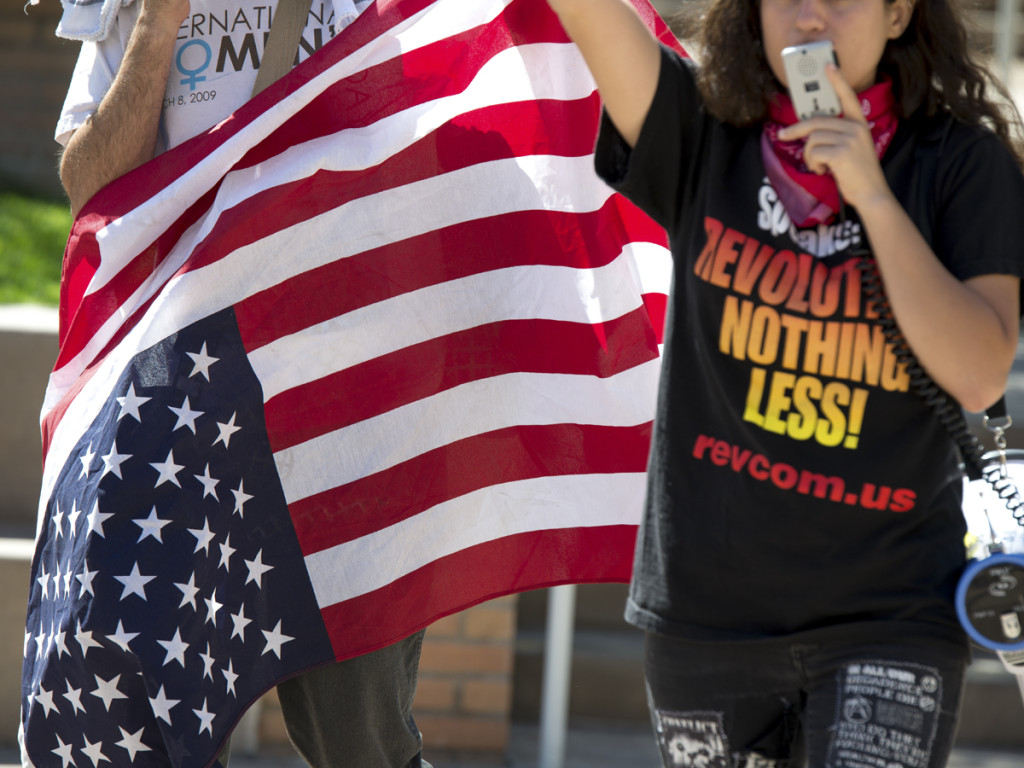The American flag is never very far from view for anybody who lives in the United States. From police stations to gas stations, the country’s colors are flown with pride.
Conversely, the flag is also a highly contentious symbol for many people who take ideological umbrage with the United States; thus, there are actions inverse to flying the colors that intend to correct what people perceive as philosophical missteps in the U.S., ranging from burning the flag to flying a flag in unconventional means.
Some people are unaware that flag-burning itself is not an act that is intended to work against the prestige of the flag. When flags are retired, the three accepted methods to do so are burial, final tribute and burning. All three of these ceremonies are intended to show the utmost respect for the flag, and thereby the utmost respect for the people, concepts and love that people hold for the United States.
Burning the flag itself became a popular symbol of protest during the Vietnam War; however, as protesters burned it as a symbol of resistance toward the militaristic values the country was touting toward communism and the way it was expending lives and money to uphold them.
This same act of flag desecration is not bound by the resistance of war though, and often comes into play as a show of no faith in the way the country is being run domestically. One need look no further than the recent incident involving a protester standing on the flag at UCR, only to be hurt when somebody tried to pull it out from under her.
The event took place during a protest against police brutality, and the student who pulled the flag from under the protester later stated that, “As a combat veteran, I have presented that flag to widows, parents and friends as a symbol of their loved one’s ultimate sacrifice. It isn’t just fabric and I wanted it off the ground. That’s it.”
We often lose the consequences of our actions in the heat of the moment, instead rushing to act so that our distress might be lessened. The student who knocked over the protester has stated that he never intended to hurt the protester; however, in situations such as these where we see symbolic speech that so deeply offends us, cooler heads must prevail.
Flag desecration in any form is symbolic speech, no matter how closely we hold the symbol to ourselves. Some may take it upon themselves to put their lives on the line for this country, and nobody can take the honor away from that decision; but it falls upon everybody to make sure that our most essential freedom is upheld, no matter how those words or acts may bite us in return.
On the other end, we must also consider the consequences of our actions when we choose to use our rights. The flag is so much bigger than any single person, as it represents the hopes, dreams and sacrifices of generations of people, regardless of whether they would approve of the current state of the country.
Actions like those taken in UC Irvine point to a more productive attempt to alleviate anxieties about the United States: attempting to relinquish the flag instead of purging it with fire. UCI voted to remove all nations’ flags from campus as they represented symbols of oppression for some, just as they were symbols of pride and hope for others. The ban was overturned by student legislature, however, and never actually took effect.
Feelings about the decision to burn or take down the flag notwithstanding, the two have essentially different meanings.
UCI’s attempt to remove the flag showed that they held the support of the U.S. as problematic, as nobody can deny our country’s checkered past — and arguably checkered present — but fire is a much more definitive act of retribution that lets the viewer know that there can be no reclamation. Fire does not cleanse, but implies that the current system must be destroyed to be rewritten. At least with the decision to remove flags from UC Irvine, they could once again be reinstated when students felt that they could later support the country and ideals the flags represent.
The United States is not beyond redemption for however many flaws it has; thus, we should look to make our speech reflect that. We can’t stop the use of flags as floormats, or keep them from being burned, and we never should. But we can encourage its use in a more constructive form of protest.
Presidential candidate Norman Thomas once stated, “If you want a symbolic gesture, don’t burn the flag; wash it.” The United States may never represent the ideals that it promotes in our lifetimes, but we can never give up on the possibility and we can keep our flag beautiful.









